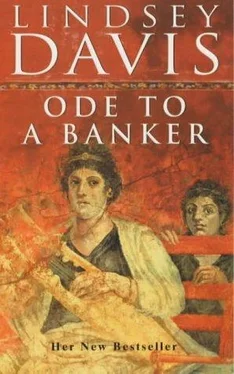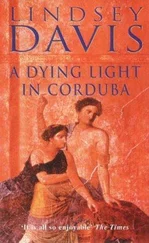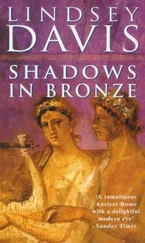Lindsey Davis - Ode to a Banker
Здесь есть возможность читать онлайн «Lindsey Davis - Ode to a Banker» весь текст электронной книги совершенно бесплатно (целиком полную версию без сокращений). В некоторых случаях можно слушать аудио, скачать через торрент в формате fb2 и присутствует краткое содержание. Жанр: Исторический детектив, на английском языке. Описание произведения, (предисловие) а так же отзывы посетителей доступны на портале библиотеки ЛибКат.
- Название:Ode to a Banker
- Автор:
- Жанр:
- Год:неизвестен
- ISBN:нет данных
- Рейтинг книги:4.5 / 5. Голосов: 2
-
Избранное:Добавить в избранное
- Отзывы:
-
Ваша оценка:
- 100
- 1
- 2
- 3
- 4
- 5
Ode to a Banker: краткое содержание, описание и аннотация
Предлагаем к чтению аннотацию, описание, краткое содержание или предисловие (зависит от того, что написал сам автор книги «Ode to a Banker»). Если вы не нашли необходимую информацию о книге — напишите в комментариях, мы постараемся отыскать её.
Ode to a Banker — читать онлайн бесплатно полную книгу (весь текст) целиком
Ниже представлен текст книги, разбитый по страницам. Система сохранения места последней прочитанной страницы, позволяет с удобством читать онлайн бесплатно книгу «Ode to a Banker», без необходимости каждый раз заново искать на чём Вы остановились. Поставьте закладку, и сможете в любой момент перейти на страницу, на которой закончили чтение.
Интервал:
Закладка:
Now I got a better squint at him: grey hair bushing back from a square forehead, with coarse grey eyebrows too, although those looked as if they had been powdered with beanflour to make them match his silvered hair. He had a limp demeanour with knowing overtones – in personality a nobody, but a nobody who was used to getting in other people's way.
'Did you invite him?' I hissed at Rutilius.
'No! I thought you must have done -'
Then without preamble the fellow began speaking. He saluted the young prince with an oozily unctuous welcome. I thought the fellow must be a court flunkey, with pre-arranged orders to thank royalty for attending. Domitian looked unmoved, however, and his attendants were openly muttering among themselves as if they too wondered who the interloper was.
We gathered the man was a regular at literary events in the Auditorium. He was taking over, and it was too late for us to intervene. He assumed everyone knew him – a true mark of mediocrity. For some astounding reason, he had appointed himself the task of formally introducing us. At the intimate event we had planned, this was out of proportion and as relevant as a pile of muleshit. Besides, it was soon clear he had no idea who we were or what we intended to read.
A speech by this drag-anchor reeked of disaster from the first word. Since he knew nothing about us, he started with that fine insult, 'I admit I have not read their work', then followed up relentlessly, 'I hear some people enjoy what they have to say.' Evidently he was not hoping for much. Finally with the air of a man who was just rushing off to have a good dinner in a back room while everyone else suffered, he asked folk to welcome Dillius Braco and Rusticus Germanicus.
Rutilius took it better than I did. As a member of the Senate he expected to be muddled up and misrepresented, whereas an informer wants to be derided for his real misdeeds as if he is a scoundrel who counts. While I froze and itched to reach for a dagger, tetchiness fired up Rutilius for a racing start.
He read first. In fact, he read for hours. He treated us to extracts from a very long military epic; Domitian was supposed to enjoy that type of dreariness. The main problem was the old bummer: lack of worthwhile material. Homer had snaffled all the best mythical heroes and Virgil had then grabbed the home crowd's ancestors. Rutilius therefore invented characters of his own and his fellows fatally lacked push. He was also, as I had always suspected, a far from thrilling poet.
I remember a line that started to, 'the Hyrcanean pard with bloodied jaws!' This was dangerously close to the lion that ripped up my brother-in-law – and it was awful poetry. At the first hint that a Lo loomed, I clamped my molars tight and waited for oblivion. It was a long time coming. A competent runner could have made it from Marathon by the time my colleague drew his extracts to a close.
Domitian Caesar had been a notable in Rome for four years – long enough to learn the art of the choreographed exit. He stepped forward to congratulate Rutilius; meanwhile his whole party swirled towards us, produced complimentary smiles, then flowed out through the doors with centrifugal smoothness. The young Caesar was sucked after them like a leaf down a drain. He vanished while Rutilius was still blushing at his polite comments. We heard pattering applause from the radically thinned-out crowd. They settled down.
It was my turn, and I could sense that I had best not read for long.
By now I had decided to leave out all my love poems. Some had already been weeded out by me at home, due to the fact that my Aglaia sequence had been written before I met Helena Justina and was possibly too personal to recite while she sat and glared at me. One or two more of my sexually specific odes had already ended up being used by her as old fish-bone wrappers. (Accidentally, no doubt.) I now realised it would be considerate to ditch the lot.
That left my satires. Helena reckoned they were good stuff. I had heard her giggling with Maia as they copied them out for me.
As I started to read, friends of Rutilius brought wine to refresh him after his ordeal; they were more decent than I had realised and some of the drink wandered my way. That may have encouraged me to forget which passages I was meaning to censor. Instead, when the audience seemed restless I jumped over what I now saw to be the boring, respectable bits. Funny how one's editorial judgement sharpens in front of real people.
They were grateful for something scurrilous. They even called for an encore. By that point I had run out of options unless I went back to Aglaia and revealed myself to have once harboured philosophical feelings for a slightly trashy circus dancer whose act was all suggestive squinns. Rifling to the end of the scroll, all I could find left were a few lines that I knew my sister Maia had once penned herself. She must have cheekily written them here on my scroll to try to catch me out.
Rutilius was beaming happily; now his ordeal was finished, he had swigged even more wine than I had. This evening had been intended as a refined diversion, a soir where we would show ourselves to be well-rounded Romans: action men who cherished moments of thoughtful intellect. An ex-consul, one with high hopes, would not thank me for inflicting on his elegant associates a rude ditty by a woman. But those very associates had plied us with a brew of startling power, so I raised my winecup and as Rutilius blearily responded, I read it anyway.
'Ladies and gentlemen, we must depart, but here's just one final epigram entitled No-longer-a-maiden's Prayer':
There are those
From whom a rose
Would make me smile;
And others I treated like brothers
Every once in a while.
An occasional kiss Hardly came amiss
Or drove anyone wild – But the gods rot
The selfish sot
Who fathered this child!
I could see Maia laughing helplessly. It was the first time since I had told her she was widowed that she had showed pure, spontaneous mirth. Rutilius Gallicus owed her that.
By then the audience were so glad of something short that they roared applause. It had been a long night. People were keen to disperse to winebars or worse. Rutilius was being carried off by his old-fashioned wife and his unexpectedly decent friends. We had time to assure one another that our evening had gone well, but he did not invite me to discuss our triumph at his house. That was fine, I need not invite him home to mine either.
I was preparing myself for ridicule from my own family and associates. I pointedly ignored the writers' circle as they toddled off in their battered sandals to whatever attic rooms they infused with their sour sweat. Petronius Longus pushed through them brutally. 'Who in Hades was the tedious ding-dong you two hired for the eulogy?'
'Don't blame us.' I scowled at the smug businessman's back as he meandered off in the midst of his clients. 'If I knew who he was, I'd arrange to meet him in a nice quiet place and I'd kill him!'
As an informer, I should have known that was a stupid thing to say.
IV
'Strange woman, your sister,' mused Petronius Longus the next day.
'Aren't they all?'
Petronius was intrigued by Maia's cheeky ditty; Helena must have told him who really wrote it. At least it distracted him from abusing my poetic efforts. Off duty now, he was heading home for a morning's nap in the apartment we sublet to him across Fountain Court Like a true friend, he had dropped in on our side; aggravating me would make his sleep sweeter.
'Does Maia Favonia still write poetry?' he asked curiously.
'Doubt it. She would say a mother of four has no time for scribbling.'
'Oh, she composed that one before she was married?'
'Maybe it explains why she hitched herself to Famia.'
Читать дальшеИнтервал:
Закладка:
Похожие книги на «Ode to a Banker»
Представляем Вашему вниманию похожие книги на «Ode to a Banker» списком для выбора. Мы отобрали схожую по названию и смыслу литературу в надежде предоставить читателям больше вариантов отыскать новые, интересные, ещё непрочитанные произведения.
Обсуждение, отзывы о книге «Ode to a Banker» и просто собственные мнения читателей. Оставьте ваши комментарии, напишите, что Вы думаете о произведении, его смысле или главных героях. Укажите что конкретно понравилось, а что нет, и почему Вы так считаете.












